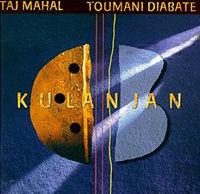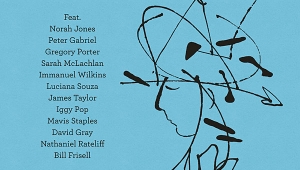| Columns Retired Columns & Blogs |
Recording of October 1999: Kulanjan
TAJ MAHAL & TOUMANI DIABATE: Kulanjan
Hannibal HNCD 1444 (CD). 1999. Joe Boyd, prod.; Jerry Boys, eng. AAD TT: 59:02
Performance *****
Sonics *****
Few of the rock-era adventurers who've worked at expanding the parameters of global music have accomplished as much as these two men. Cooder's Zelig-like capacity to melt into the style he's exploring—the trademark of the consummate session player—made his duets with Ali Farke Toure and his collaboration with the Buena Vista Social Club two of the world-music high points of the 1990s. But Mahal—who has been a maestro of this scene over the years, working with everyone from Bob Marley to the Hula Blues Band—is an auteur; his musical explorations tell us about his personal quest for a unifying element in the myriad forms he explores. Kulanjan is his most important world-music work to date.
Hannibal HNCD 1444 (CD). 1999. Joe Boyd, prod.; Jerry Boys, eng. AAD TT: 59:02
Performance *****
Sonics *****
The Rising Sons became legendary for their historic influence on 1960s blues-rock, inspiring many a player besides Duane Allman to pick up the slide and call down the blues like sweet showers of rain. It would have been quite a stretch, though, to predict that the Sons would become a touchstone of world music via the solo careers of its two best-known members, Taj Mahal and Ry Cooder.
 | |
This is precisely what makes Kulanjan so exciting. Here Mahal and kora master Toumani Diabate, with his six-piece Malian ensemble, build a bridge between the eccentricities of American country-blues guitar and the West African music from which, Mahal firmly believes, it evolved. By placing guitar and kora side by side and feeling out their common tonalities, Mahal proves his premise in what amounts to a musical Rosetta Stone of country blues.
"Queen Bee" wastes no time demonstrating the beauty of this arrangement. Taj Mahal engages in an instrumental and vocal duet here, exchanging a softly phrased walking line from the Delta blues with elegant clusters of melodic riffs from Diabate's kora, while alternating verses with the Malian vocalist, whose high, sweet tones contrast wonderfully with Mahal's burnt sienna. In the last verse, the two voices entwine in a rapturous exchange.
"Tunkaranke" approaches the dialog from the African perspective with a slow-building, spiritual vocal punctuated by guttural wordless accompaniment from Mahal. The session returns to the deep south for the harder blues of "Ol' Georgie Buck," wherein Mahal sets down a gutbucket repeated phrase over which Diabate lays vertiginous layers of kora lines, like a hummingbird lingering in flight before disappearing.
"The master hunter...Kulanjan," Mahal whispers at the intro to the title track, a gorgeous Malian melody sung and played by Diabate with effortless grace, and framed by a beautifully simple descending scale on Mahal's National steel guitar. Taj goes on to try his hand at Malian vocals on "Fanta," accenting the language with blues phrasing, which contrasts instructively with Diabate's own smooth phrasings.
"Catfish Blues" demonstrates Mahal's implied premise—the connection between West African music and the blues—most effectively. He slows this guitar-and-vocal standard down to the contemplative cadence of his Malian accompanists and proceeds to channel Robert Johnson into a West African sound.
"Gueda Man Na" and "K'an Ben" offer more spellbinding sounds of Malian poetry which in the case of the latter are translated in the CD booklet as "Ah my love, I hope to see you soon/we're so far away from each other/always love those who love you/it's so difficult to find someone you can trust..." (Mahal and Diabate giddily echo each other's picking in the lighthearted "Take This Hammer," one of several songs on the set that make you marvel at how these two musicians invented compatible tunings for this project. Both are bending notes, seemingly adjusting the parameters of their individual styles, to arrive at a common, almost instinctual common ground.
Diabate waxes eloquent on "Atlanta Kaira" in the kind of performance that could have the jam-band kids clamoring for more. The instrumental duet "Mississippi-Mali Blues" shows that Diabate can even do a little string-bending in between his lightning runs. The two players double lines on the melodic fragment that opens "Sahara," a satisfying conclusion to a meeting of musical minds and spirits that is certain to resonate far into the future.—John Swenson
- Log in or register to post comments




































